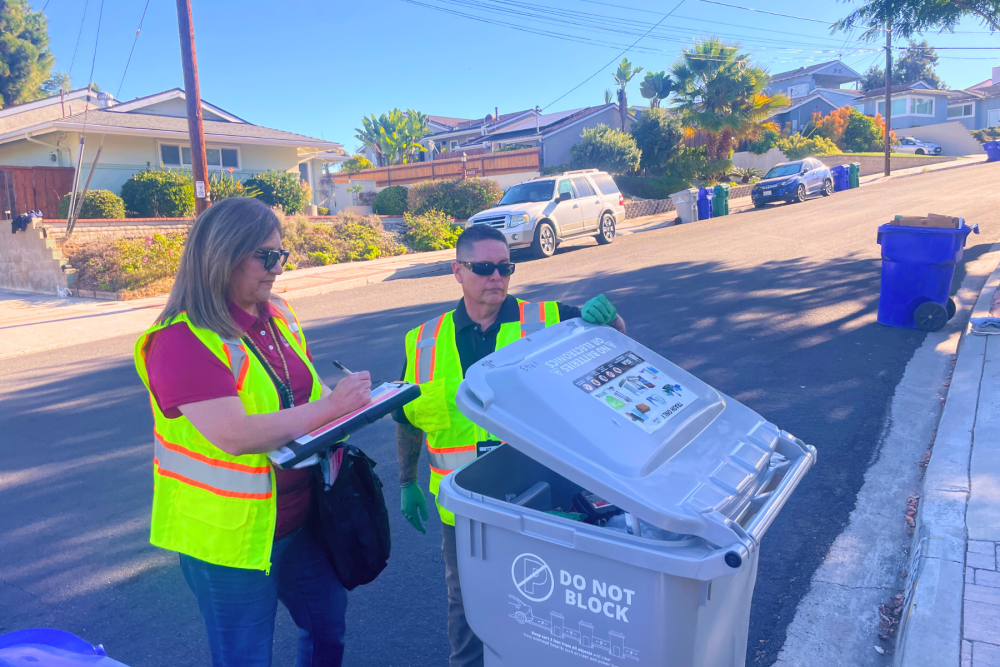Flipping Container Lids to Help Residents Remember Trash and Recycling Rules

Noticed an “oops” tag on your waste bin on collection day? Don’t worry — it's just friendly feedback from the City of San Diego to help everyone recycle right! As part of the City’s ongoing efforts to monitor and reduce contamination in trash, recycling and organic waste bins, code enforcement officers from the Environmental Services Department (ESD) are conducting citywide container checks, which are required under state law through Senate Bill 1383. Also known as “lid flips,” these container checks help spot items that don’t belong in the trash, recycling and organic waste collection bins.
Fires and equipment damage caused by contaminants can lead to costly repairs and a dangerous environment for everyone.
“Safety is the City’s No. 1 priority when it comes to our collection, disposal and code enforcement crews,” said Alex Galasso, Program Manager for ESD’s Waste Reduction Division. “The more we can educate people about how dangerous things like propane tanks, lithium-ion batteries and other household hazardous waste can be in the collection bins, the more we can protect our staff and our equipment from harm.”
Batteries and other household hazardous waste should never go in any bin because of their potential to spark a fire. So far in 2025, the City has seen 25 waste collection truck fires.
Container checks are being conducted on collection days, as early as 6 a.m., at residential properties serviced by ESD. Containers are inspected while they are at the curb for collection. Code officers check bins by lifting the lid and taking a scan of what is visible at the top; they do not dig through trash or open bags. Officers are also available to provide helpful resources and answer any questions residents might have.
“Even at that surface level observation, we’re able to glean valuable information on how to design and focus our outreach and education efforts to improve waste diversion efforts,“ said Galasso, adding that container checks will be an ongoing effort. “With ambitious waste reduction goals and limited capacity in the City’s municipal landfill, proper recycling and waste reduction is essential. We can all do our part to help ensure sustainable and affordable waste management in San Diego for years to come.”
If code officers find contamination, they leave behind an “oops” tag that provides information about proper waste sorting practices. If food or plastic bags are found in a blue recycling bin, for example, a “Recyclables Only” tag would be placed on the bin’s handle, indicating that the blue bin is for glass, metal, paper, cardboard and rigid plastic.
Receiving an “oops” tag doesn’t result in immediate penalties but rather indicates that there is a need for improvement. Each tag left on a bin identifies the issue and how to correct it. Plastic bags are the most common contamination seen in blue and green bins. Even if labeled compostable, they don’t break down at the City’s composting facility, and they can get tangled in and jam the recycling sorting equipment.
Food scraps can be placed in paper bags before going in the green bin, but recyclable items such as cans and bottles should be placed in the blue bin loose (not in a bag). All tagged bins will still be collected, except in cases where household hazardous waste, a dangerous obstruction or overweight materials are found. In those situations, a “Do Not Collect" sticker is placed on the bin with instructions on how to properly dispose of the items.
In October, the City began delivering new gray trash bins to households eligible for City-provided trash service. With more than 225,000 eligible households, the delivery process is expected to continue over the course of several months, with some properties receiving their new bins in the new year. Eligible customers are encouraged to set up an account in the Residential Waste Collection Services Portal, which allows them to view their service history, manage container needs and receive alerts about bin delivery, recycling events and other important updates.
ESD is available to help with questions or anyone in need of assistance. Contact them by calling 858-694-7000 or emailing trash@sandiego.gov.
